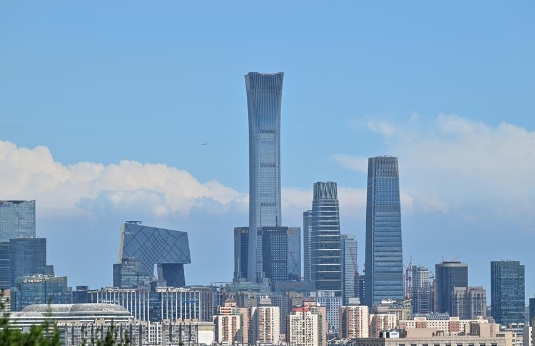China's modernization drive: inspirations, opportunities for Africa

This photo taken from Jingshan Hill on Aug. 12, 2024 shows the skyscrapers of the central business district (CBD) on a sunny day in Beijing, capital of China. (Xinhua/Li Xin)
We observe key lessons to take from China and its modernization path to inform our own realities, histories, and strategic areas of comparative advantage in Africa.
From July 15 to 18, the 20th Central Committee of the Communist Party of China (CPC) held its third plenary session, in which it discussed, reviewed and adopted resolutions to advance Chinese modernization.
The outcomes of the 3rd plenary session of the 20th Central Committee of the CPC, as they relate and speak to the progress the CPC and the people of China are making in modernization, are significant for South Africa and the entire African continent. Not only do they provide a model of development, but also confidence in the ability of a people to determine their own future, as well as reaffirm that the West does not have a monopoly on the development path.
In fact, the progress made by the Chinese people leads to an alternative trajectory to modernization, premised on the ability to scientifically study our own economic and social contradictions, identify our own productive forces for development, and find the appropriate political systems and forms of democracy necessary to galvanize our peoples forward.
More significantly, China's modernization demonstrates that substantial development strides can be made without subjugation, exploitation, or the extractive accumulation of resources -- features of the modernization history of the West. Modernization, industrial development, and economic growth should align with political and social systems that work to eradicate poverty, improve living conditions for all people, and secure a better future for all of humanity. To me, this is what we should call civilization, modernization, and human development.
The development of China also provides possibilities for South Africa, the African continent, and the entire global South. The Global Development Initiative and the Global Security Initiative proposed by China provide a basis for greater continental cooperation in Africa, like the optimal utilization of the African Continental Free Trade Area (AfCFTA), especially within the frameworks of the Forum for China-Africa Cooperation (FOCAC) and the BRICS mechanism. In recognizing the value of the modernization path and advocating for closer cooperation between Africa and China, we are not suggesting that Africa should blindly adopt the Chinese model. Unlike the West's approach after World War II, arguing that there is a unilinear path to development, we believe that Africa should adapt China's experiences to its unique context and needs.
The 2024 summit of the FOCAC will be held in Beijing from Wednesday to Friday, at a critical juncture with African economies still distressed by shocks resulting from the COVID-19 pandemic.
There are also growing ruptures across the continent emanating from the economic consequences of unsustainable debts, playing out in popular protests in some countries. Governments are also under pressure to deliver on their commitment to upgrade respective economies up the value chain and shift their focus from aid to trade.
The Dakar Action Plan, adopted by the 8th Ministerial Conference of the FOCAC in 2021, offered a comprehensive plan for trade promotion and facilitation, strategic market access, and product value addition. One of the key outcomes in the upcoming summit should be to make an appraisal of the progress of commitments made by both parties, identifying stumbling blocks, as well as areas of excellence to strengthen cooperation. One of the key issues for this summit must include mechanisms for building sustainable peace and stability across the region, peaceful management of regional tensions and prospects for enhancing intra-trade, strengthening AfCFTA and regional blocks.
We observe key lessons to take from China and its modernization path to inform our own realities, histories, and strategic areas of comparative advantage in Africa. First, the ability and courage to accurately analyze our material conditions, including our contradictions. Second, the robustness to adapting Marxism to the prevailing conditions. Third, developing political systems of governance and democracy that galvanize society towards our development goals. Fourth, clarity on economic policy and intervening instruments for maximizing productive forces for growth and advancement. Finally, building state capabilities for governance, effective development, human advancement and order.
Editor's note: Sithembiso Bhengu is the director at the Chris Hani Institute, South Africa. He is also a senior research associate in Sociology Department, University of Johannesburg.
The views expressed in this article are those of the author and do not necessarily reflect the positions of Xinhua News Agency.
Editor:伏娅敏
